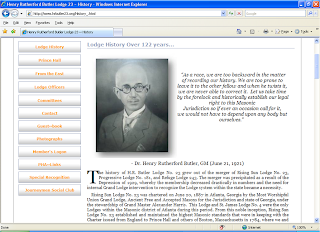Friday, March 4, 2011
Research 2.0: Henry Rutherford Butler + Internet + Internet Archive
Archives and technology. It’s difficult to summarize in a post how technology has and continues to radically change research. Suffice it to say we have taken the digital turn, an exhilarating if not dizzying shift. This is a case in point.
Recently Nicole Carmolingo, a former AARL intern, wrote an entry about Henry Rutherford Butler for publication in the New Georgia Encyclopedia. Butler, one of the first African American physicians to establish a practice in Atlanta, lived from 1862 to 1931. While this date range is significant in terms of United States and African American history, one way to view Butler’s life span is through the lens of copyright law. Most of the written traces that document his education, career, and fraternal affiliations are in the public domain, that legal space where technology giants like Google Books thrive, and repositories, including AARL, turn for digitization projects, see here. (Note: AARL holds the Selena Sloan Butler family papers, which include materials related to her husband Henry Rutherford Butler and son Henry Rutherford Butler Jr.)
In addition to traditional research methods, Carmolingo surfed the internet to gather a great deal of biographical information using published secondary sources that are now online. Examples include Daniel Wallace Culp’s Twentieth Century Negro Literature (Or a Cyclopedia of Thought on the Vital Topics Relating to the American Negro, by One Hundred of America's Greatest Negroes), published in 1902, and Edward. R. Carter’s The Black Side: A Partial History of the Business, Religious, and Educational Side of the Negro in Atlanta, Ga. from 1894. My fact checking of her entry, part of the editorial process, also was aided by Google Books and online repositories, such as the Internet Archive. (I credit the Atlanta History Center’s now-defunct blog, Pardon Our Backlog, for the tip.)
In one instance, I needed to verify the name of Butler and colleague Dr. Thomas Heathe Slater’s business, Butler, Slater & Co – the first drug store licensed by the state that was owned by and operated for African Americans. As many researchers know, the Atlanta City Directory, accessible in print form and microfilm, is a go-to resource for information about the city’s people and places. The big news, however, is that some are now digitized; sample a virtual copy of the 1878 volume here. What would have taken a visit to another repository and an hour or more of research to fact check one company name turned into a few minutes of sitting and clicking, thanks to the Internet Archive.
Of course, not everything is or will be digitized. Today’s researchers must balance traditional and contemporary practices to yield the best results. But at this moment in time – when each day holds new online discoveries – technology-enabled changes that facilitate access to the records of our collective past are still something to marvel.
Posted by Wesley Chenault, Library Research Associate
Labels:
archives,
Atlanta History Center,
grants,
Henry Rutherford Butler Sr,
National Historical Publications and Records Commission,
New Georgia Encyclopedia,
research,
Research 2.0,
Selena Sloan Butler
Subscribe to:
Post Comments (Atom)




No comments:
Post a Comment